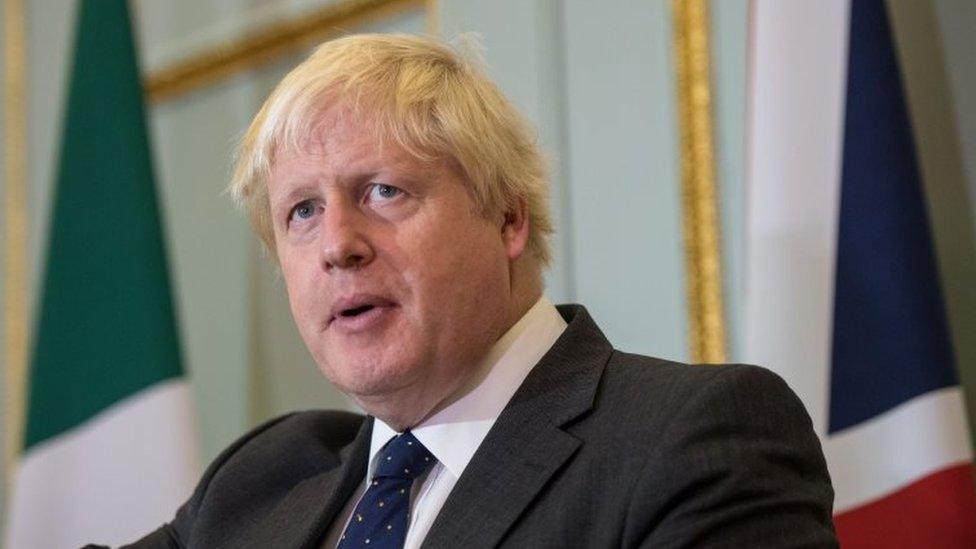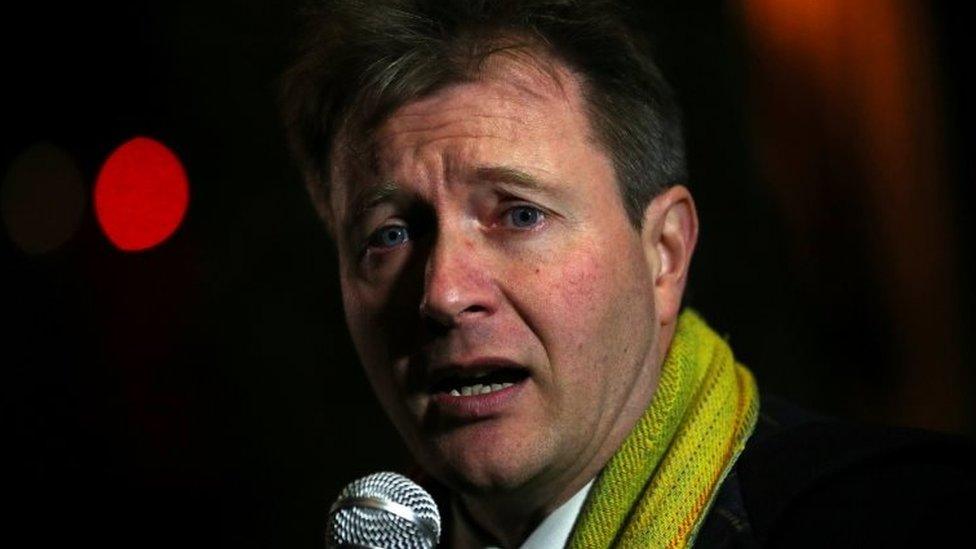Boris Johnson under pressure over jailed mum in Iran case
- Published

Boris Johnson's visit to Iran will be his first as foreign secretary
When Boris Johnson arrives in Tehran this weekend, the foreign secretary will be required to perform some nifty diplomatic footwork even before he comes to address the case of Nazanin Zaghari-Ratcliffe.
For relations between Britain and the Islamic Republic of Iran are delicate at the best of times.
It is only six years since a mob stormed and sacked Britain's embassy in Tehran.
And to some in Iran, Britain will always be seen as the "Little Satan", a former imperial power that meddles in their country's affairs at America's bidding.
Both the UK and Iran have now restored diplomatic relations. But good relations are a work in progress.
So this visit, Mr Johnson's first, is designed above all to stabilise what has at times been a difficult relationship, a trip that was planned long before the case of Mrs Zaghari-Ratcliffe became a frontline political issue.
And when Mr Johnson sits down for a lengthy session with his counterpart, Mohammed Javad Zarif, on Saturday, there will be much else to discuss.
They will talk about the Iran nuclear deal.
Tehran believes it has not reaped the economic benefits it expected from the agreement it struck to curb its nuclear ambitions.
Britain wants to encourage Iran to stick with the agreement despite Donald Trump's decision not to certify the deal.
They will talk about Yemen where Iran is backing the rebel Houthi forces.
The foreign secretary will want to urge Tehran not to supply missiles that the Houthis have targeted at Saudi Arabia's airport.
Tehran will want to see what kind of political process, if at all, is being contemplated by the Saudi-led coalition.
They will also want to talk about Iran's behaviour in the Middle East that Britain sees as destabilising.
Tehran will want to discuss how the West is planning to help rebuild Syria now that so-called Islamic State has been largely routed out.
'Huge pressure'
So it is within the context of these debates that both sides will discuss the fate of Mrs Zaghari-Ratcliffe, the British Iranian mother who was arrested in 2016 and jailed for five years for vague charges of plotting against the Iranian state - charges she categorically denies.

Nazanin Zaghari-Ratcliffe was arrested in Iran in 2016
The difficulty that Mr Johnson has is one of expectations.
Ever since the foreign secretary mistakenly told MPs that Mrs Zaghari-Ratcliffe was training journalists in Iran when in fact her family have always insisted she was on holiday, Mr Johnson has been under pressure to compensate for his error.
His erroneous remarks were used by the Iranian regime to justify fresh charges against Mrs Zaghari-Ratcliffe.
So Mr Johnson is now under huge pressure from campaigners and her husband Richard Ratcliffe to bring her home.
Yet Mr Johnson will not be travelling with Mr Ratcliffe, as some had hoped might be possible.
The Foreign Office says it wants to secure a permanent family reunion, not a temporary one.
And Mr Johnson is also not expected to visit Mrs Zaghari-Ratcliffe in prison, something else that was asked of him.
If the British ambassador has been refused access, why might the Iranians grant it to a visiting foreign secretary?
The problem is that there might actually be only so much that Mr Johnson can do.
He can talk to Mr Zarif until he is blue in the face.
But there are others within Iran - such as the Revolutionary Guard Corps and the ultra-conservative judiciary - who perhaps will have a greater say over her fate.
UK debt
The Iranians know how much the British want to get Mrs Zaghari-Ratcliffe home.
Being told that again directly by Mr Johnson may not change matters significantly.
Some in the UK want Mr Johnson to pay off a long standing debt owed to the Iranians in an attempt to curry favour with Tehran.
The UK owes Iran about £400m for some Chieftain tanks it promised the former Shah of Iran but never delivered after the 1979 revolution.
The problem is that this debt has nothing to do with the Zaghari-Ratcliffe case.
The UK has agreed to pay the money but can't until a legal way is found to get round the sanctions that currently make repayment impossible.
There is also the strategic reluctance to allow any linkage between the two issues.
Iran could pocket the money and quite legitimately refuse to release Mrs Zaghari-Ratcliffe because this is a debt, not a quid pro quo.
The UK is also arguing strongly that she should be released on humanitarian grounds and is reluctant for her to be caught up in some grand bargain with Tehran.

Richard Ratcliffe has been campaigning for his wife's release
Britain does have some cards in its favour.
It has come out strongly in favour of keeping the Iran nuclear deal, backing Tehran over Washington.
The UK has also spoken out strongly against President Trump's recognition of Jerusalem as the capital of Israel.
The problem is that this is, above all, a consular case.
That means Britain can make an argument but ultimately it is Iran that will decide.
Tehran does not recognise the concept of dual nationality so in its eyes Mrs Zaghari-Ratcliffe is Iranian.
And her future is thus seen as a matter for the sovereign state of Iran.
'Moments of hope'
In truth, though, this is not just any other consular case.
Mr Ratcliffe believes his wife is a pawn in a much larger diplomatic game, a bargaining chip whose life is being cruelly manipulated by some parts of the Iranian government to secure their political objectives.
There are occasional moments of hope.
In recent weeks a spokesman for Iran's judiciary has said that Mrs Zaghari-Ratcliffe could be freed if she qualified for conditional release.
An Iranian health commissioner has conducted an assessment of her mental and physical well-being after she suffered from insomnia, depression and panic attacks.
Mr Ratcliffe says that Mr Johnson being in Iran "can only make things better".
But right now all his wife can look forward to is her next court appearance, which is scheduled for Sunday.